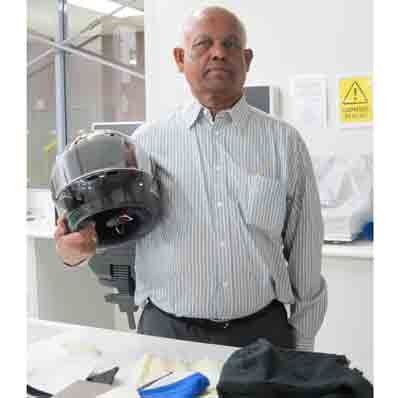Dr Sinnappoo Kanesalingam, a researcher at RMIT University in Australia is currently persuading helmet manufacturers in tropical countries like Vietnam to consider his new motorbike helmet design which he hopes to bring into the market within the next 12 months.

His new helmet design enables the temperature inside the helmet to lower by 9 degrees Celsius using innovative textile materials that reduce heat, making the headgear more comfortable to wear. He offers the promise of much greater comfort for people living in hot climates like Vietnam.
According to Dr Kanesalingam, this breakthrough will benefit other types of helmet as well, including those worn on construction sites. The temperature reduction will address a major safety issue in helmets, as people avoid wearing them to escape the discomfort from heat and sweat.
Dr Kanesalingam says he has found that by using innovative textiles such as Polymeric Water Absorbent Textile (PWAT) materials and Phase Change Materials (PCM) to line helmets, the temperature inside can be lowered.
“The PWAT material provides a drop in temperature of 8 to 9 degrees Celsius within the helmet, while PCM can cause temperature drops of 3 to 4 degrees Celsius,” he said.
According to Dr Kanasalingam, a low weight and environmentally friendly textile helmet liner made of one of these materials can be incorporated within the helmet without changing the basic helmet design.
“The liner can also be used in new helmets and can be adapted to use in other areas such as construction sites where helmets are mandatory,” he said. “In tropical countries such as Vietnam, Singapore, Malaysia and Indonesia, helmets are often perceived as uncomfortable and restrictive, so finding a solution to this problem to minimize head injuries in accidents is important.”
The inventor expects that reducing heat stress may also help reduce the number of motorcycle accidents, with riders better able to concentrate on the road.
“I hope my findings will persuade motorcycle riders to wear the cooler helmets, which will ultimately result in fewer accidents, hospitalization and trauma and reduce the cost of motorcycle accidents,” Dr Kanesalingam said.
The production model of his helmet liner is expected to sell at an initial cost of around VND1.5million and around VND800, 000 to VND1 million for children’s helmets. If produced in large quantities the costs could drop to VND400, 000-700,000.






)

















